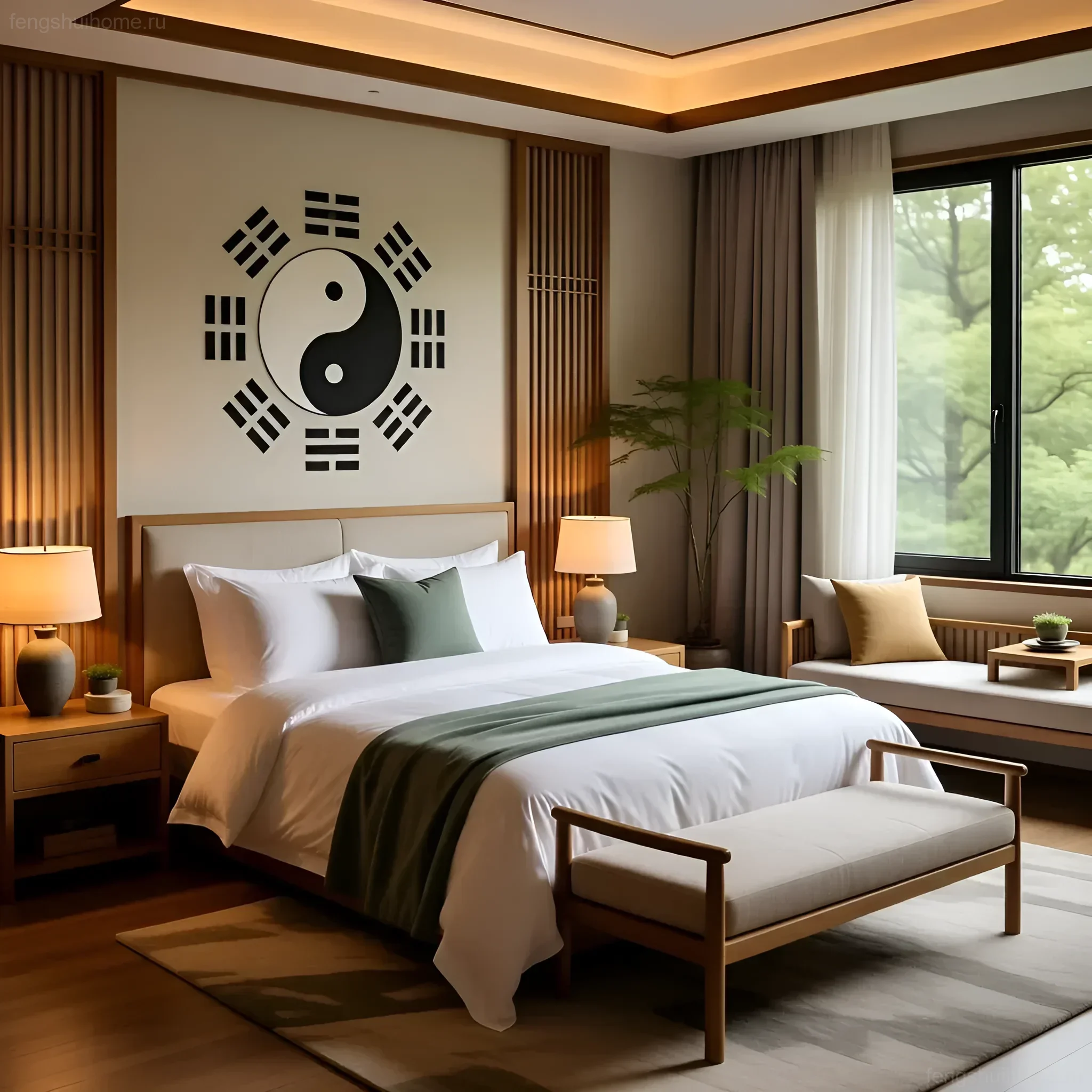The ancient Chinese practice of Feng Shui (literally “wind and water”) aims to harmonize a person with their environment. One of the most important areas requiring attention is the bedroom, as a person is most vulnerable and open to energy flows during sleep.
Sleeping on the floor, at first glance, may seem like a minimalist or even romantic solution. However, from the perspective of energetic hygiene, it is a serious violation that can lead to stagnation in affairs, health problems, and a general decrease in vitality.
Why Sleeping on the Floor is Taboo in Feng Shui: An Introduction to Sleep Energetics

A sleeping person spends about a third of their life in this state, and during this time, their energy field is actively renewed and restored. Feng Shui views sleep as a process that requires maximum protection and optimal energy movement.
The main problem with sleeping on the floor is related to two key concepts:
- Sheng Qi and Sha Qi: Vital, auspicious energy (Sheng Qi) should circulate freely around the body, while negative, stagnant, or “killing” energy (Sha Qi) tends to accumulate in the lower layers of space.
- Humidity and Cold: The floor is the coldest and most humid part of the room. From a Feng Shui perspective, an excess of Yin energy (cold, passivity) penetrates the body, leading to energetic imbalance and health problems.
The essence of the prohibition: When a person sleeps directly on the floor, they find themselves in the accumulation zone of “earthly” Sha Qi, which hinders personal growth and prevents the influx of fresh, renewing energy.
Earth Energy and Your Sleep: How the Floor Affects Qi Flow

Qi energy moves in waves and flows. Ideally, a protective cocoon of auspicious energy should form around the sleeping body. When the bed is raised, there is space underneath for free circulation, allowing Sha Qi to dissipate and Sheng Qi to nourish the person.
The Problem of Lacking an Air Cushion
A key element in bedroom Feng Shui is the air cushion between the body and the floor. This cushion performs several functions:
- Insulation from Sha Qi: A raised bed acts as a barrier, preventing the heavy, stagnant energy of the floor from directly affecting a person’s aura.
- Freedom of Circulation: The space under the bed (provided it’s not cluttered) allows energy to move freely, preventing stagnation.
- Symbol of Growth: In Feng Shui, height symbolizes opportunities and growth. A low sleeping position can energetically “ground” a person, blocking career and financial prospects.
“Sleeping on the floor puts a person in a position of submission and stagnation, as they are constantly under the influence of the heaviest and most inactive form of Yin energy,” assert experts from bur4ik.ru.
Consequences of Sleeping on the Floor According to Feng Shui: What Can Go Wrong?

Violating the rules of bedroom arrangement according to Feng Shui has far-reaching consequences that manifest not only on a physical but also on a metaphysical level. These consequences are divided into three main categories.
1. Impact on Health (Physical Aspect)
- Hypothermia and Humidity: Sleeping in the coldest zone of the room weakens the immune system, leads to problems with kidneys, joints, and chronic colds.
- Dust and Allergens: The floor accumulates the maximum amount of dust, pet dander, and allergens, which directly affects the quality of breathing and sleep.
- Excess Yin: Constant exposure to Yin energy can lead to apathy, depressive states, and chronic fatigue.
2. Impact on Well-being (Financial Aspect)
The absence of “elevation” symbolizes a lack of growth in life.
- Career Stagnation: The sleeping person is energetically “pressed” to the ground, which affects their ability to move forward.
- Loss of Opportunities: Sha Qi energy suppresses initiative and hinders the perception of new perspectives.
- Financial Instability: Stagnant energy in the bedroom often correlates with stagnation in cash flow.
3. Impact on Relationships (Personal Aspect)
When Qi does not circulate freely, it creates tension.
- Lack of Support: Sleeping on the floor can symbolize a lack of reliable support or backing in relationships.
- Conflicts: The accumulation of negative Sha Qi energy in the bedroom can become a source of irritability and frequent quarrels between partners.
Exceptions to the Rules: When Sleeping on the Floor is Acceptable (and Even Beneficial)

While classic Feng Shui insists on elevation, there are specific contexts where sleeping on the floor or very low surfaces may be acceptable.
1. Cultural and Traditional Aspects
- Tatami in Japan: Traditional sleeping on tatami mats and futon mattresses is not considered a violation if the room is organized according to strict rules. Tatami are made of natural materials, have thermal insulation, and are often raised above the subfloor.
- Meditation Practices: For short rest or meditation aimed at grounding (connecting with Earth energy), temporary sleep on the floor can be beneficial. However, this does not apply to nighttime sleep.
2. Temporary Situations
If sleeping on the floor is a temporary measure (e.g., while traveling, at a dacha, or visiting friends), its negative impact is minimal. Feng Shui focuses on a permanent sleeping place.
3. Floor Covering Features
If the floor is equipped with a heating system, and the room is perfectly dry and clean, the physical factors of cold and moisture are eliminated. However, the energetic factor (proximity to Sha Qi) still remains, so it is recommended to use a thick, insulating mattress.
Important condition: Even in exceptional cases, it is necessary to ensure perfect cleanliness and the absence of any objects under the sleeping place to minimize energy stagnation.
How to Properly Organize a Sleeping Place According to Feng Shui: Practical Tips

To reverse the negative consequences of sleeping on the floor and attract auspicious Sheng Qi energy into your life, you need to follow the basic principles of Feng Shui when choosing and positioning your bed.
1. Bed Height and Construction
- Mandatory Legs: The bed should be raised at least 15–20 cm above the floor. This ensures free Qi flow.
- Open Space: It is strictly forbidden to store things under the bed. This creates energy stagnation and hinders renewal.
- Solid Headboard: The headboard should be sturdy and solid (not slatted), symbolizing support and stability in life.
2. Placement (Command Position)
The bed should always be in the “Command Position,” which means:
- The headboard is against a solid wall.
- The sleeper should be able to see the room door but not be directly opposite it (the “coffin” effect).
- The bed should not be in a direct line with a window and a door (Qi draft).
- Both sides of the bed should have free access and bedside tables (a symbol of equality and balance in relationships).
3. Materials and Colors
Preference should be given to natural materials (wood, cotton, wool). Avoid metal frames if they are not grounded, as metal can amplify electromagnetic radiation.
Alternatives to Sleeping on the Floor: How to Improve Sleep Energy Without Changing Habits

If you prefer a minimalist style and don’t want to use a bulky bed, there are several Feng Shui-friendly alternatives that provide the necessary insulation and Qi circulation.
1. Platforms and Podiums
Instead of placing the mattress directly on the floor, use a low podium or platform. The main condition:
- Ventilation: The platform should have ventilation holes or be slightly raised to prevent dampness and stagnation.
- Storage Drawers: If built-in drawers are used, they should be clean and contain only sleep-related items (bedding), not work documents or old clutter.
2. Using Thick Mattresses and Bases
If you cannot raise the mattress, maximize the thickness of the insulating layer:
- Use a mattress at least 25 cm thick.
- Place a thick, natural rug (wool, cotton) under the mattress, which will serve as an energetic and thermal barrier.
3. Energetic Floor Cleaning
Regularly clean the floor and the space under the sleeping area (even if it’s very low). Use salt water or aromatic oils (lavender, sandalwood) to neutralize the accumulation of Sha Qi.
FAQ: Most Frequent Questions About Sleeping on the Floor and Feng Shui

Q: What should I do if I have a very small room and no space for a bed with legs?
A: Even in the smallest room, it is necessary to ensure minimal elevation. Use a low frame or pallets that create at least 5–10 cm of air space. If this is not possible, regularly air out the mattress and the floor underneath it to prevent moisture and energy stagnation.
Q: Is sleeping on a mattress on tatami considered sleeping on the floor in Feng Shui?
A: Traditional tatami, especially if it is raised above the floor, provides better insulation than just a mattress on laminate. This is acceptable because tatami is a natural, breathable material that does not promote moisture stagnation and Sha Qi as much as concrete or tile.
Q: If I sleep on a sofa, is that better than sleeping on the floor?
A: Yes, in most cases, a sofa or sofa bed that is raised on legs provides the necessary air gap and is considered a better solution from a Feng Shui perspective than direct contact with the floor.
Interesting Facts About Feng Shui and Sleep: Ancient Traditions and Modern Research
The connection between the height of the sleeping place and well-being is traced not only in ancient Chinese texts but also finds confirmation in modern psychology.
- Sense of Security: Psychologists note that a raised position during sleep subconsciously gives a person a sense of security and control over their space, which contributes to deeper and more restorative sleep.
- Historical Context: In many ancient cultures (including European ones), sleeping on the ground was the lot of the lower classes or those on the move. Royalty and nobility always slept on high, richly decorated beds, symbolizing their status and protection from “earthly” problems.
- “Dirty Floor Theory”: Modern hygiene research confirms that the concentration of dust and microorganisms sharply increases at a height of up to 15 cm from the floor, making sleep in this zone unfavorable for the respiratory system.
